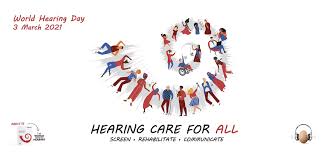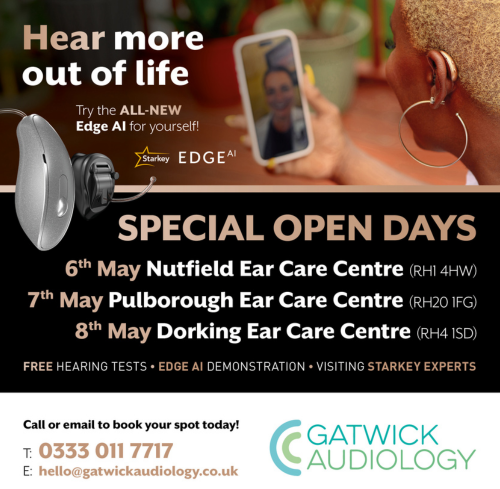
Deaf Awareness Week 2021
May 5, 2021Hearing loss globally has reached record numbers, especially during the COVID-19 pandemic

The World Health Organisation designated March 3 as World Hearing Health Day in
order to raise awareness to the growing numbers of those suffering from hearing loss
and the importance of hearing health care.
In 2020, the WHO stated that approximately 466 million people worldwide have a
hearing loss – 34 million of these are children. It is estimated that by 2050,
approximately 900 million people worldwide (or one in 10) will have a hearing loss.
During the pandemic, many with hearing loss have recognised hearing difficulties due
to masks. These are people who have been overcompensating through lip reading.
Some realised they were lip-reading but also denied they had hearing loss while others
have not recognised the extent of their deficiency until they could no longer read
lips.
Gatwick Audiology is supporting the awareness day to educate and inform about
hearing loss, diagnosis, prevention, and treatment. “Noise-induced hearing loss is a
preventable and significant factor,” said Prince Punnoose, Owner and Chief Clinical
Audiologist at Gatwick Audiology, “This growing health problem is often unrecognized
in adults and children and it leads to a long list of problems including depression,
isolation, academic delays, impaired communication, and cognitive decline. We are
grateful that this awareness day was created to shine a light on the significance of
hearing loss.”
As the baby boomer population ages, more people are forced to face hearing health
challenges. According to the National Institutes of Health NIDCD, approximately 40
percent of people in the UK over 50.
While age is still the greatest factor in hearing loss, many younger people also
experience hearing problems due to exposure to loud music and noises including
occupational noise. Among adults aged 70 and older with hearing loss who could
benefit from hearing aids, fewer than one in three (30 percent) have ever used them.
With adults aged 20 to 69 only approximately 16 percent of those who would benefit
from hearing aids have ever used them.
“Audiologists are the experts in hearing health,” Mr Punnoose explained. “Anyone
suspecting a hearing issue should see an audiologist who will run a series of tests to
determine the problem, if there is one, and will then recommend treatment.”
Some signs of hearing loss may include:
- Suddenly having to turn up the volume of the television, radio, or stereo and
having
other family members complain that the volume is too loud. - Difficulty understanding people speaking to you and asking people to repeat
themselves. - Difficulty with phone conversations and understanding the other person.
- Sudden inability to hear the doorbell, the dog barking, and other household
sounds. - People telling you that you speak too loudly.
- Ringing in the ears.
School-aged children with hearing loss will sometimes exhibit poor school
performance because they can’t understand the teacher assignments or classroom
interactions. If hearing loss has been present from a young age, they often don’t
recognise the loss and can’t identify the problem.
Contact us to book an appointment to discuss your hearing health at hello@gatwickaudiology.co.uk or call 0333 011 7717.




